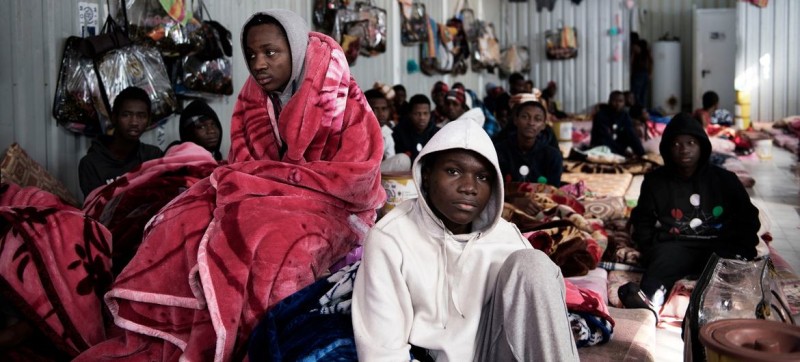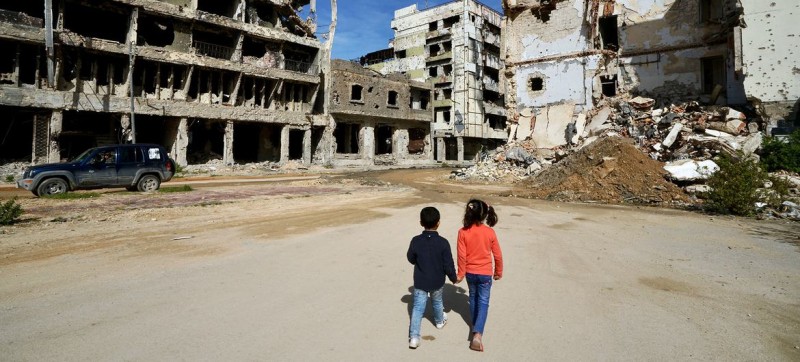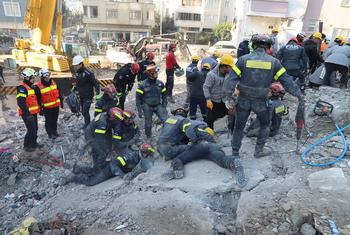
© UNICEF/Alessio Romenzi Migrants sit inside a building at a detention centre in Libya. (file)
In the case of State security forces, human rights violations were committed to quash dissent and exploit vulnerable migrants, with no justice in sight, according to the latest report, from the Independent Fact-Finding Mission (FFM) on Libya.
Tweet URL
It documents the “widespread practice” of arbitrary detention, murder, torture, rape, enslavement and enforced disappearance in the country. In addition, the Mission states for the first time that sexual slavery was committed against migrants.
“There is an urgent need for accountability to end this pervasive impunity,” said Mohamed Auajjar, the Mission’s chair. “We call on Libyan authorities to develop a human rights plan of action and a comprehensive, victim-centred roadmap on transitional justice without delay, and hold all those responsible for human rights violations accountable.”
Libya has been in turmoil since the ouster of former long-time leader Muammar Gaddafi, with the country divided between rival administrations and warring militias, with a UN-recognized Government of National Accord based in the capital Tripoli and the forces of General Khalifa Haftar’s so-called Libyan National Army holding sway in the east and southern areas of the oil-rich nation.
No accountability
The Mission which has reported since 2016, noted that accountability for the violations was severely lacking, as most survivors were too afraid and mistrustful of the justice system to officially report the abuse. As a result, the violations continue “unabated”, the Mission said.
As its mandate comes to an end next week, the Mission called for the creation of new rights monitoring and investigation mechanisms, to “support Libyan reconciliation efforts” and help the authorities achieve “transitional justice and accountability.”
Widescale exploitation of migrants
The report notes that more than 670,000 migrants from over 41 countries were present in Libya in the period since July 2022, when the Mission’s mandate was last extended, until March of this year.
The Mission interviewed more than 100 migrants over the course of its investigations and its report points to “overwhelming” evidence of systematic torture and sexual slavery, among other violations.
Detention centres in which migrants were enslaved were “under the actual or nominal control” of the authorities, including the Directorate for Combating Illegal Migration and the Libyan Coast Guard.
The “widescale” exploitation of migrants is a lucrative business, the Mission said, noting that “trafficking, enslavement, forced labour, imprisonment, extortion and smuggling generated significant revenue for individuals, groups and State institutions.”
Abuses in detention
Detention-related violations were also found to affect Libyans on a large scale, and the Mission points to the responsibility of State authorities and their leadership.
The report notes that victims “came from every segment of Libyan society and included children, adult men and women, human rights defenders, political participants, civil society representatives, members of military or security forces, legal professionals and persons of perceived or actual diverse sexual orientations and gender identities.”
Most of those interviewed by the Mission were held without charge in horrific conditions, “subjected regularly to torture, solitary confinement, held incommunicado” and denied access to water, food and other essentials.

© UNOCHA/Giles Clarke Children walk past damaged buildings in Benghazi in Libya.
Women’s rights going in reverse
According to the Mission, the situation of women in Libya has only worsened over the past three years, in a context of a “weakening of State institutions” amid the rising power of armed groups.
The report documents “systematic” discrimination against women, a rise in domestic violence, which is not punished by any comprehensive law, and a lack of accountability for crimes against prominent women leaders, such as the enforced disappearance of member of parliament Sihem Sergiwa nearly four years ago, and the killing of Hannan Barassi in 2020.
The Mission reiterated its call on the authorities in Benghazi, where the two high-profile crimes took place, to “adequately investigate” them and bring the perpetrators to justice.
Investigation mechanism still needed
Established by the Human Rights Council in 2020 to investigate human rights violations by all parties since the beginning of 2016, the Mission’s mandate ends on 4 April, at a time when “the human rights situation in Libya is deteriorating, parallel State authorities are emerging and the legislative, executive and security sector reforms needed to uphold the rule of law and unify the country are far from being realized,” says the report.
In this context, the Mission calls on the Human Rights Council to establish a “sufficiently resourced, independent international investigation mechanism,” and on the Office of the United Nations High Commissioner for Human Rights to create another mechanism “with an ongoing mandate to monitor and report on gross human rights violations in Libya.”
Violators should be ostracized
Among other recommendations, the report calls on the international community to “cease all direct and indirect support to Libyan actors involved in crimes against humanity and gross human rights violations against migrants, such as the Directorate for Combating Illegal Migration, the Stability Support Apparatus and the Libyan Coast Guard.”
The Mission also says it will share its findings with the International Criminal Court, including a list of “possible perpetrators” of international crimes.
UN Human Rights Council-appointed rights experts such as the members of the Mission work on a voluntary and unpaid basis, are not UN staff, and work independently from any government or organization.
Political deadlock
Following a UN-brokered ceasefire in October 2020, elections were due to take place in December 2021, but were postponed.
Last month, Abdoulaye Bathily, Special Representative for Libya and head of the UN’s political mission in the country (UNSMIL) announced to the Security Council a new initiative aiming to facilitate the holding of presidential and legislative elections before the end of the year.
Speaking about the need for reconciliation in Libya, Mr. Bathily said at the time, “Reconciliation is a long-term process that should be inclusive, victim-centred, rights-based and grounded on transitional justice principles.”

Türkiye-Syria Earthquake
DONATE!
Emergency and search-and-rescue teams have deployed to assess and prioritize urgent needs and to provide life-saving assistance following the devastating earthquake near the Türkiye-Syria border.

